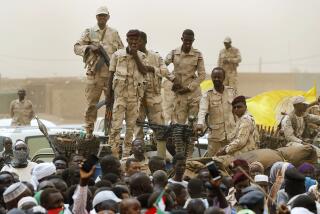Leveraging the Olympics
PRESIDENT BUSH tightened the screws on the Sudanese government Tuesday, stiffening U.S. financial sanctions aimed at ending the ongoing genocide and displacement in Darfur. It was a long-overdue move, though Bush’s tough talk may be aimed at the wrong country. The Darfur crisis probably won’t be resolved until more pressure is brought to bear on China, and the real impetus for that pressure isn’t coming from Washington but from Hollywood.
Sudanese President Omar Hassan Ahmed Bashir clearly doesn’t lose much sleep over threats of international sanctions. For four years, he has presided over a campaign of murder and rape against the people of Darfur to punish rebel factions seeking a share of the nation’s oil wealth. Despite continual attempts to negotiate a peace treaty or send in a 22,000-member-strong United Nations force to protect civilians, there has been no letup to the killing and only one small breakthrough on peacekeeping: In April, Bashir agreed to allow 3,000 U.N. personnel to join the 7,000 overstretched African Union troops in the region.
On Tuesday, Bush targeted several Sudanese companies and individuals for U.S. financial sanctions and vowed to seek tougher U.N. sanctions against the country. This was probably met with a yawn in Khartoum.
China, the biggest buyer of Sudan’s oil and a prime source of development aid, is the only country whose opinion really matters to Bashir. China has blocked sanctions against Sudan in the U.N. Security Council and will doubtless do so again unless the rest of the world imposes a price for its support of the genocidal regime.
In recent months, Hollywood celebrities have been more successful than world leaders in exacting that price. Show-biz people are in a unique position to rattle China because it is about to put on the biggest show in its history: the 2008 Summer Olympics in Beijing. Thus, when director Steven Spielberg, an artistic advisor to the Games, sent a personal letter to Chinese President Hu Jintao requesting a change in policy toward Sudan, it got attention. Shortly afterward, Bashir permitted the 3,000 U.N. peacekeepers, and the timing may not have been coincidental. Meanwhile, calls from actress Mia Farrow for a boycott of the “Genocide Olympics” and efforts by actors Don Cheadle and George Clooney to point out China’s role in the conflict are generating anxiety in Beijing.
China, which sees the Games as a sort of coming-out party, is desperate to avoid an embarrassment like the 1980 boycott of the Moscow Olympics. Yet it can’t pretend to be a world leader, or even a responsible member of the international community, while funding a genocide. If it doesn’t change its stance toward Sudan, there will be a bloodstain on next year’s Games visible around the world, boycott or not.
More to Read
Sign up for Essential California
The most important California stories and recommendations in your inbox every morning.
You may occasionally receive promotional content from the Los Angeles Times.










